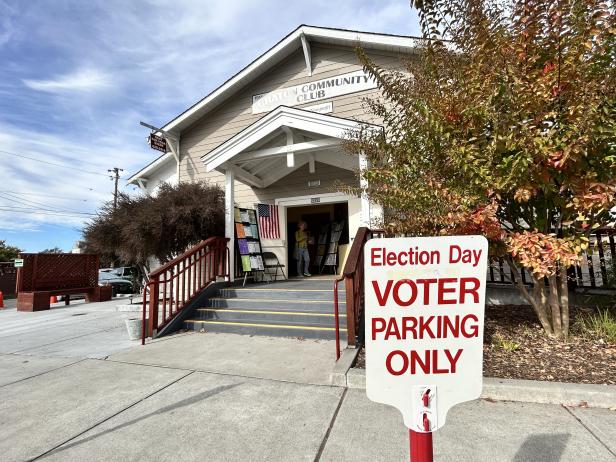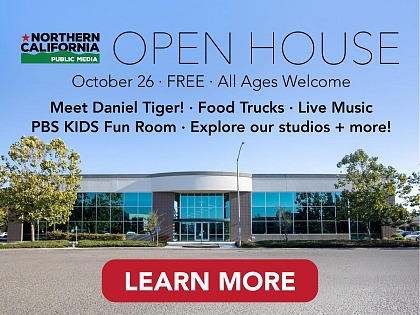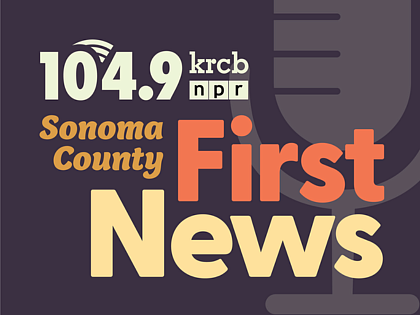 photo credit: Lauren Spates
photo credit: Lauren SpatesThe polling place at the Graton Community Club on Nov. 5, 2024.
KRCB News spent some time today outside the Graton Community Club then Forestville Elementary, asking voters the same question we asked Camille Hodges, a Graton resident: How are you feeling?
“A little anxious because there’s a lot riding on today’s election,” Hodges said.
Patrick from Santa Rosa said he’s in the same boat. “Oh boy! Anxiety, for sure. Anxiety,” he said, “and hope, really.”
Pamela Augustine from Graton said she wishes politics were still a quiet duty that didn’t spill into family relationships. Election season is tough for her.
She said she feels “sad, always sad,” this time of year. “I grew up in Ohio. My family lives there. I just went back,” Augustine said of a hard trip to her hometown.
Sharon Martinelli from Forestville said she thinks voters are carrying the weight of history.
“I think, we’re somewhat apprehensive. I think that would be normal today given what the situation is but, we’re also hopeful. It could be a historic day, so we’re hoping for that,” Martinelli said.
These may be historic times, but Sebastopol therapist Andrea Kirk says these feelings are typical.
“Around these election periods, I've seen a significant increase in anxiety, trepidation, anger, people feeling very confused and overwhelmed,” Kirk said.
Each of those emotions can be tricky to manage for a short period of time, but for some people, it has been weeks or months of experiencing these feelings. It can be hard to live like that.
Kirk said she began to appreciate in graduate school that large-scale, dramatic events like natural disasters and relationship abuse aren’t the only challenges that cause trauma.
“But in reality, most humans experience some kind of stressor that exceeds their capacity to cope and overwhelms their nervous system,” Kirk said, “and that is actually trauma.”
So, what do the experts advise when sustained, daily stress kicks up anxiety, deepens sadness, or makes you feel overwhelmed?
Matthew Callahan is professor of psychology at Sonoma State University. He said he offers voters the same guidance he teaches his students: Use a three-step process to manage when emotions are big. First, use what he calls the “percentage hack.” Think of yourself as a device that holds a charge, or a gas tank with a tilting needle, and ask yourself, “What percentage are you at?” at any given time.
“‘What percentage am I at?’” Callahan said he asks himself. “Like today, I’m all right. I’m at about 70%. I’m prepping my classes and I’ve already voted, I’ve decided not to dwell on things. I’m at about 70%. The day after the election, who knows what happens? I may not sleep. I may be at 20%. And so the first thing to do is to acknowledge to the self, where am I? Am I at a half tank, or am I really running on fumes?”
Step 2 is to pay attention to your body. Do you feel tight in the throat? Are you taking deep enough breaths? Is the back of your neck getting hot? Callahan says these clues are critical.
“So you're kind of checking in with the body, and then you begin to think, ‘Okay, what might these be expressions of? ‘Oh, I'm angry. Oh, I'm feeling despair.’ And what you do, very important, you notice them in a gentle and friendly way, literally, like you're observing something interesting. ‘Oh! All right. Lots of anxiety is happening with me right now.’ ‘Okay, there's my aggressive mind.’ ‘I'm rehearsing conversations that I'm going to have with people.’ ‘All right, so I'm angry.’ And so you name as best you can what you were experiencing and what you were feeling,” Callahan said.
Callahan said the final step is to calm your body.
“So think about whichever area of areas of the body are the most tense. Put a gentle hand there and maybe say something to yourself like ‘peace’ or ‘It's okay.’ For me, I'll put my hand on my head, my forehead, and I'll say, ‘Rest. Rest your mind,” he said.
Kirk, the practicing therapist, said she agrees. Take a few moments throughout the day to think about how your body feels. How do your feet feel as they stand on the ground? Do you notice how your back or your arms feel touching the chair? Have you heard your breath moving in and out of your nose and mouth, or has there been silence because you’ve been holding it in?”
“And you can focus on only one of those, or you could even notice all three of them at the same time: sources of support, gentle tug of gravity and the feeling of your breath,” Kirk said. “And what's great about this tool is that you can practice it anywhere, at any time. You can do it while you're driving. You can do it while you're standing in line at the grocery store, right? It doesn't take a whole lot out of your day.”
Kirk calls this “micro self-care” — the idea that you don’t need to take a 6-mile hike, get a massage, or hit the gym to unwind.
“Many of us, especially when we're overwhelmed, sometimes I can even just feel out of reach so simple, small things that just kind of bring us back right to the simplicity, or even walking outside and noticing the sensation of the sun warming your skin, just getting through this moment right here and right now,” Kirk said.
With plans for a walk in the west county redwoods tonight, I’m Lauren Spates reporting for KRCB Sonoma County News in Monte Rio.
Editor's note: Due to a typographical error, we have corrected the spelling of Matthew Callahan's name.

 Live Radio
Live Radio




